My main objective in writing this article is to dispel, once and for all, the notion that John F. Kennedy broke his promise to provide direct US intervention in the form of air cover for Brigade 2506 at the Bay of Pigs. This imaginary “broken promise” is often erroneously cited as evidence that he is to blame for the mission’s failure. That interpretation of the evidence can be shown to be false on several counts. But first, another topic is raised when we explore the implications of this conclusion, namely: If it is true that JFK never promised to provide direct US military intervention in the form of air cover to begin with, then why are there so many attempts to implicate members of the anti-Castro Cuban community as probable co-conspirators in his assassination? I will address both issues in this essay. But first, I’m going to begin by summarizing the chronology of the events. The brief timeline below comes from several sources, including, but not limited to, the following:
1) The Report of the Cuban Study Group, tasked by JFK to find the cause(s) of the failure, whose members consisted of the Chief of Naval Operations, Admiral Arleigh Burke; the Director of Central Intelligence, Allen Dulles; the Attorney General, Robert Kennedy; and General Maxwell Taylor, whom JFK had recalled from retirement to head up the inquiry
2) The Foreign Relations of the United States (FRUS)
3) The CIA Report on the Invasion of Cuba
4) Oral interviews and eyewitness accounts
Early 1960: The plan originated from within the CIA. Eisenhower approved of the plan in March of that year. Of course, at that time, the operation did not resemble what eventually evolved into Operation Zapata, aka: the Bay of Pigs Invasion. [remainder of chronology to be added here]
As we all know, a president is ultimately responsible for the actions of those within his administration even if he did not authorize those actions. JFK rightfully took public responsibility for the Bay of Pigs debacle even though the blame lay elsewhere. In other words, the buck stopped with him and he claimed it as is own. I think we can all agree, however, that there is a great deal of difference between a president who knowingly and willingly abandons allies by callously breaking his word to provide them with promised air cover and President John F. Kennedy… whose last standing order to those responsible for the execution of the operation—the evening of April 16th—was that all of Castro’s remaining air force be destroyed while still on the ground prior to the arrival and landing of Brigade 2506 on the beach or, absent that, the mission would be scrubbed. This order was countermanded without JFK’s approval or knowledge, resulting in the disastrous outcome of the operation and accounts for the oppression under which thousands of Cubans were made to suffer or die at the hands of Fidel Castro and his brother, Raul. It is not difficult to imagine the anger that members of Brigade 2506 and their families would have felt toward JFK if he had, in fact, chosen to deliberately abandon those to whom he had pledged his support or simply because that is what the anti-Castro Cubans were led to believe by their CIA handlers even though it was untrue. Would the Central Intelligence Agency promote such a myth designed to intensify that anger and draw attention away from their own role in the disaster? It’s not difficult to imagine the Central Intelligence Agency creating that myth, as well as another, namely, the assertion that the anti-Castro Cubans hated JFK because of the Bay of Pigs and were therefore somehow involved in his murder. But, upon closer scrutiny, most of these assumptions are revealed to be fabrications promoted by the CIA. These myths include:
1) JFK’s alleged refusal to provide promised air cover, which I will show to be false 2) The anti-Castro Cubans’ alleged expectation that Kennedy would provide direct US military intervention (air cover), which I will show to be false 3) The alleged hatred toward Kennedy harbored by the anti-Castro Cubans, which has been often repeated, but for which there is little evidence beyond anecdotal references 4) And finally, their alleged participation in his murder
[This last one conveniently relies upon the assumed veracity of one of the other myths. Its basis rests upon the elements of motive, means and opportunity, except that only one of those has been cited, namely, motive—in the form of hate filled revenge for the Bay of Pigs—and evidence for that remains thin.]
By trumping up a motive to implicate the anti-Castro Cubans in Kennedy’s murder, as in “they wanted revenge for the Bay of Pigs”, the Agency only addressed one of the three elements, namely, motive, while conveniently ignoring means and opportunity. But means and opportunity are critical elements of any murder investigation and cannot be ignored. The exchange between Jim Garrison and Bill Broussard from the movie JFK applies not only to the Mob, as it was used in the film, but also to the anti-Castro Cubans:
“Could the Mob (or anti-Castro Cubans) change the parade route, Bill, or eliminate the protection for the President? Could the Mob (or anti-Castro Cubans) send Oswald to Russia and get him back? Could the Mob (or anti-Castro Cubans) get the FBI the CIA, and the Dallas Police to make a mess of the investigation? Could the Mob (or anti-Castro Cubans) appoint the Warren Commission to cover it up? Could the Mob (or anti-Castro Cubans) wreck the autopsy? Could the Mob (or anti-Castro Cubans) influence the national media to go to sleep? And since when has the Mob used anything but .38’s for hits, up close. The Mob (or anti-Castro Cubans) wouldn’t have the guts or the power for something of this magnitude. Assassins need payrolls, orders, times, schedules. This was a military-style ambush from start to finish…”
Indeed, like the Mob, the anti-Castro Cubans had neither the influence nor the power for something of this magnitude. In other words, not only did they lack the motive to commit the crime, they lacked the means and opportunity, as well. This lack of means and opportunity applies to both the assassination and the ensuing cover-up, which itself is a separate crime of obstructing justice. I hope to demonstrate this lack of anti-Castro Cuban motive, means and opportunity both through official documentation and also through the application of critical thinking.
Perhaps equally important is the discovery of the Agency’s continued obfuscation of the facts to this day. Just last week I checked Wikipedia’s account of the Bay of Pigs. When I reached the critical timeframe of April 16, 1961, the night before the invasion, I was not nearly as surprised by what I found as much as I was surprised by the identity of the source of the disinformation. From Wikipedia it says: “Late on 16 April, President Kennedy ordered cancellation of further airfield strikes planned for dawn on 17 April, to attempt plausible deniability of US direct involvement.”
I was very disappointed that the source cited for this erroneous information—who should have known better—was none other than the Director of the Cuba Documentation Project for the National Security Archives: Mr. Peter Kornbluh. Wiki obtained this quote from his book, “Bay of Pigs Declassified: The Secret CIA Report on the Invasion of Cuba” –
Of course, I had obtained my copy of the “Secret CIA Report” a long time ago. Not a copy of the Kornbluh book mind you, but a copy of the actual Secret CIA Report on the Invasion of Cuba. My source was the Chief of Special Operations in the Office of the Joint Chiefs of Staff, the late Colonel L. Fletcher Prouty, USAF. It was from this previously classified documentation that I was able to find the facts out for myself.
Yet another example of continued disinformation was only declassified very recently. In November of 1984 Dr. Jack B. Pfeiffer, former Chief of the CIA’s History Staff, unsuccessfully attempted to get his manuscript titled, “The Taylor Committee Investigation of the Bay of Pigs” declassified. The majority of it remained classified for more than 25 years and was only recently approved for release on July 25, 2011—less than 3 years ago from the time of this writing—and more than 50 years after the Bay of Pigs. I have relied on very little from the report itself, other than to show how it is self-impeaching. However, the fact that it even exists remains very relevant to the topic I wish to cover.
It is somewhat reminiscent of the type of report that a former Warren Commission staffer might write today: packed full of details, many of which lack relevance, while presenting evidence in a manner intended to bias the reader to a foregone conclusion. In some instances he completely misrepresents the facts—and does so in one of the most important aspects of this sabotaged operation. He claims that Secretary Rusk had JFK on the phone when Cabell and Bissell told Rusk of the likelihood of disastrous consequences if the D-Day airstrikes were cancelled. That claim is demonstrably false.
Pfeiffer is conflating JFK’s refusal to launch direct US Military intervention (US Navy jets off the aircraft carrier, USS Essex) with the already (by then) cancelled anti-Castro Cuban piloted B-26 D-DAY airstrikes from Puerto Cabezas, Nicaragua! That these were two completely distinct and separate “histories” of the operation—one being a part of the original plan and the other prohibited by law and never a part of the plan—is not in question. Why Pfeiffer chose to obfuscate the record, however, remains suspect. In actuality, by the time Rusk finally did call JFK on the phone to put CIA’s General Cabell on the line, it wasn’t until 4:30 on the morning of D-DAY, which was already several hours too late for the B-26’s to have eliminated Castro’s air force on the ground!
Thus, it is evident that by then CIA was no longer requesting that the D-Day pre-dawn airstrikes be reinstated, as it was already too late for that. Rather, they were requesting DIRECT US MILITARY INTERVENTION as Cabell had fighter jets on stand-by from the USS Essex. In other words, they were now requesting exactly what the President had made clear would not be allowed under any circumstances, namely: Direct US Military Intervention, which was never in the plan and which was not expected by the anti-Castro Cubans, as reported by Colonel Jack Hawkins less than a week prior to D-Day in an Emergency Dispatch Cable to Washington.
An example of, what I like to call, “revisionist memory” comes from a somewhat unexpected source: that same Colonel Jack Hawkins, Chief of the Paramilitary Staff of the Cuban Project. In a self-serving article in December of 1996 Hawkins makes the following claim:
“I was in the CIA operations room at about 10 P.M. on April 16, three hours before the troops were to commence landing, when Mr. Esterline [Chief of the Cuba Project] hurried in with an ashen face and told me that the President had canceled the second attack on Castro’s air force, the one scheduled for first light the next morning. Appalled, I rushed to the telephone and called Mr. Bissell, who was at the State Department, and urged him in the strongest terms to call the President and explain that the invasion force faced certain destruction unless the order was reversed. I predicted that our troop transports would be under air attack and some or all would be sunk.
“After my plea, Mr. Bissell and General C. P. Cabell, the Deputy Director of the CIA, spoke to Mr. Rusk. He telephoned the President, who had left Washington, and told him that the CIA wanted to reinstate the air strike; that he believed the decision should be changed. McGeorge Bundy, the National Security Advisor, seconded Rusk’s advice. The cancellation remained in effect.”
However, as it happens, Colonel Hawkins account is in direct opposition to that of both General Cabell and Richard Bissell as memorialized in a letter that they wrote to General Maxwell Taylor during the investigation being conducted by the Cuba Study Group. Moreover, in an oral interview conducted by Jack Pfeiffer that was included in his work cited above, Jake Esterline places most of the blame for the Bay of Pigs failure on Richard Nixon, not on JFK.
Five days before D-Day, at a press conference on April 12, Kennedy was asked how far the U.S. would go to help an uprising against Castro. “First,” he answered, “I want to say that there will not be, under any conditions, an intervention in Cuba by the United States Armed Forces. This government will do everything it possibly can… I think it can meet its responsibilities, to make sure that there are no Americans involved in any actions inside Cuba. The basic issue in Cuba is not one between the United States and Cuba. It is between the Cubans themselves.”
Consistent with this statement made by the President is documentation that supports the idea that not only was the plan considered extremely likely to succeed by top military advisers, as well as intelligence community advisers, but that there never was a plan for direct US intervention under any circumstances and the anti-Castro Cubans did not expect it!
In this memorandum to the Cuban Study Group we find the contents of an Emergency Cable from the CIA’s Chief of the Western Hemisphere, J.C. King, to Colonel Jack Hawkins while the latter was in Puerto Cabezas, Nicaragua visiting the anti-Castro Cubans of Brigade 2506 four days prior to the invasion. In the message, Hawkins is asked if his opinion of the Brigade’s readiness for combat and its chances of success had changed in the past few days since his arrival there. He was also informed that the President has made it clear that under no circumstances would there be any direct US involvement in the operation. Hawkins reply of the same day reflected his overwhelming confidence in the Brigade’s ability to win based on his observations of their training, their aircraft, combat equipment, supplies, and on interviews he conducted with members of the Brigade themselves in their native language. He also acknowledged the President’s “non US intervention” policy, stating that the Cuban’s did not expect it.
From the Cuban Study Group’s report: “From its inception the plan had been developed under the ground rule that it must retain a covert character, that is, it should include no action which, if revealed, could not be plausibly denied by the United States and should look to the world as an operation exclusively conducted by Cubans. This ground rule meant, among other things, that no U.S. military forces or individuals could take part in combat operations.”
Referring to the evening/night of April 16th, from the FRUS:
“The Secretary of State indicated subsequently that their [Cabell & Bissell] presentation led him to feel that while the air strikes were indeed important, they were not vital. However, he offered them the privilege of telephoning the President in order to present their views to him. They saw no point in speaking personally to the President and so informed the Secretary of State.”
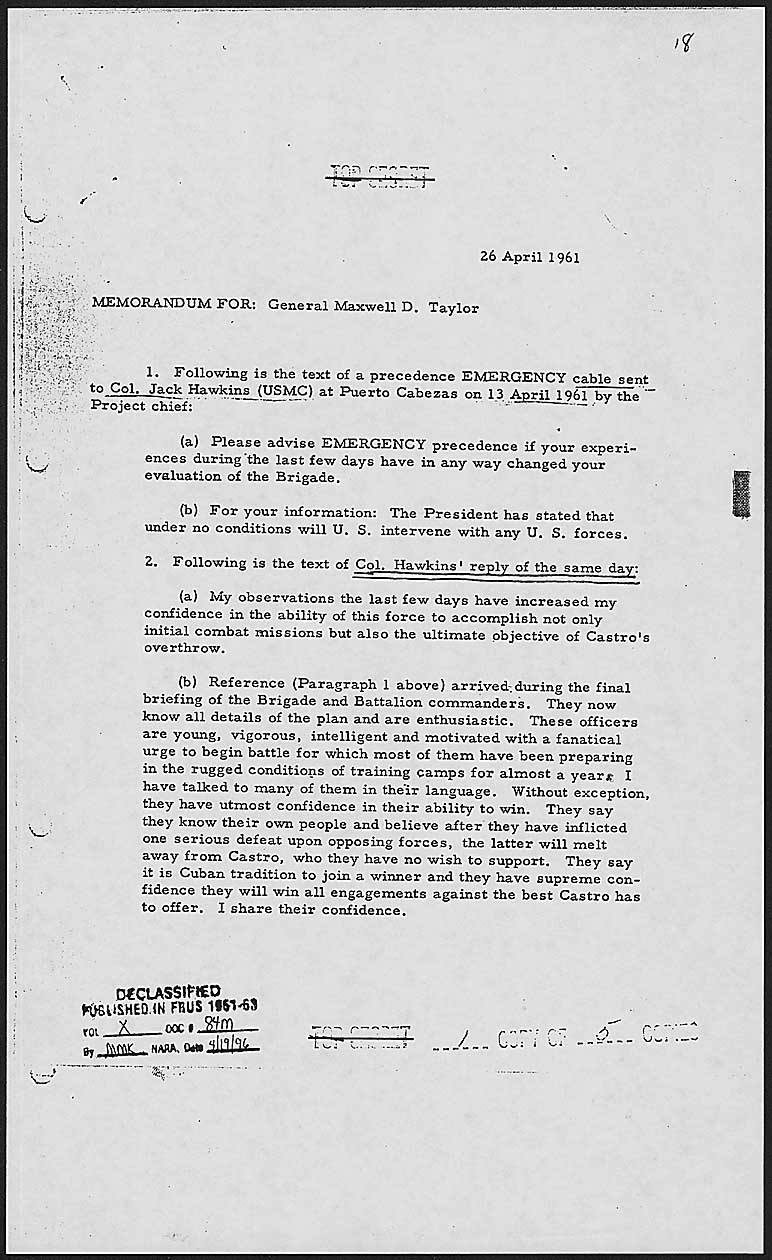
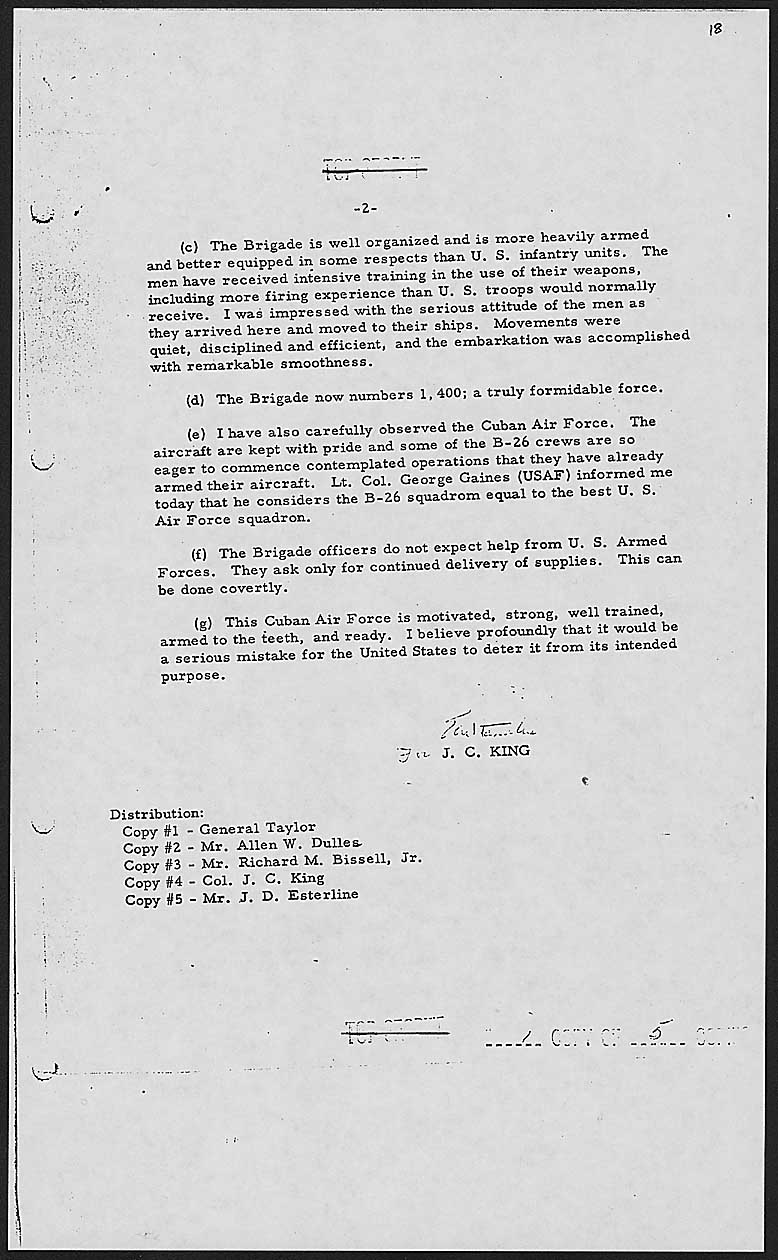
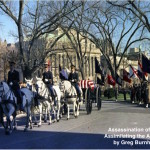
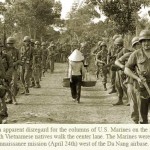
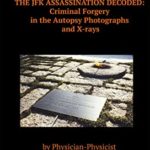
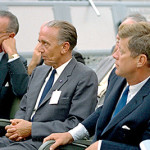
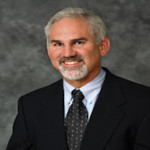
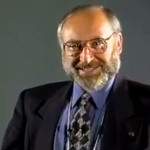
Greg, great article!
There are (as far as I know) only one thing that points to Kennedy letting down the Cubans in this case – that he took the blame for it.
Other than that, there are several facts that says something else: Setting up an investigation and thus deciding on NSAM 55, 56, 57, letting Dulles, Bissell and Cabell go, the actions of McGeorge Bundy, Dulles (being not reachable in his largest operation as DCI), the “quitting episode” of I think it was Hawkings and his colleague (dont remember his name), the whole scenario from March 1960 to the Lame Duck Period with the escalation of the operation, not to mention the increase of number of troops, the ridicolous talk about “going guerilla” and many more arguments such as what you write: “Hawkins reply of the same day reflected his overwhelming confidence in the Brigade’s ability to win based on his observations of their training, their aircraft, combat equipment, supplies, and on interviews he conducted with members of the Brigade themselves in their native language. He also acknowledged the President’s “non US intervention” policy, stating that the Cuban’s did not expect it.” Would Kennedy investigate what had happened if he knew what had happened? I dont think so.
The Cuban’s were maybe used as a double whammy: They were perhaps under orders and told over and over again that Kennedy had betrayed them, but in reality maybe they were on the same level as the rogue agents from the mob? As far as I can see Kennedy was alone from Day One, they just thought that he would be a push-over, or he would look like a fool. One thin I dont understand, why didnt “they” ever attack Cuba (with missiles etc) after JFK was dead? That part lacks answers IMO.